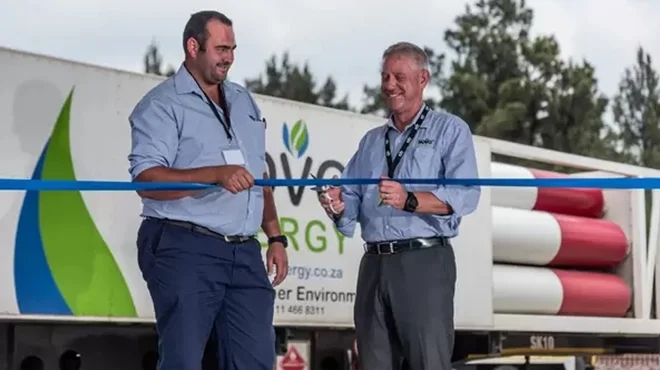Entrepreneur Andri Hugo is on a quest to position Novo Energy as a leading supplier of clean, alternative energy and authority in the natural gas economy of South Africa.
This as the company recently unveiled its R130 million state-of-the-art natural gas compression (NGC) station in Witbank, Mpumalanga, to meet the growing demand for cleaner and sustainable energy in the country battling an energy crisis that has seen Eskom implementing rolling blackouts to try to keep the lights on.
Hugo, the chief executive of Novo Energy, describes as strategic the setting up of the facility in Mpumalanga, saying the coal mining province is considered the global number one hotspot for nitrogen dioxide emissions.
In an interview with Business Report, the businessman says the Novo Energy is committed to providing integrated energy solutions in South Africa and help the country move away from its coal based economy, among other things.
Hugo says the firm is also committed to strengthening energy security, revitalising Mpumalanga’s economy and playing a central role in environmental impact reduction.

He wants gas to be at the front and centre of the country’s total energy mix – where it makes up about 3 percent – in order to stimulate economic growth and development and job creation.
“We are in a predicament. We don’t have sufficient reliable electricity to grow our economy, so gas is definitely going to play a major role in the total energy mix going forward,” says Hugo, who holds a bachelor of engineering degree (honours) in technology management from the University of Pretoria.
“There are lots of energy reserves in southern Africa. Africa has been blessed with an abundance of resources, including minerals, energy, natural resources and human capital. A combination of these, through industrial activity, can address most of the socio-economic challenges we face.”
Novo Energy was established in 2008 and has grown to supply GNG to industrial, mining, pharma, agri, food, and transport customers.
“We also supply government hospitals in the Gauteng region. We have switched their boilers from using diesel and coal to using natural gas,” he says.
Hugo says they also supply the Johannesburg Metro Police Department with CNG as some of its vehicles run on natural gas, and Tshwane’s A Re Yeng Bus Rapid Transit system as all its buses run on CNG.
“This is quite a nice fuel to use in vehicles and it’s a lot more cheaper. There are massive savings for customers to switch to gas.”
Hugo says the reason they built the facility in Mpumalanga, aside from meeting the growing demand for CNG, is to supply customers who are not on an existing gas pipeline.
“As a gas aggregation hub we can receive gas, process the molecules, and manage the logistics of getting the gas to our customers,” he says.
“From mines, to bakeries, factories, hospitals or a fleet – we deliver the CNG to our customer’s sites via road and our gas packs installed on trailers, are then fed into either a factory or refueling station.”
He says many businesses across various industries have never had access to the natural gas pipeline and have been restricted to the use of coal and refinery products that are dirty and expensive.
“Now because of this new infrastructure we can help them make the switch to natural gas – a cleaner more sustainable alternative energy that’s half the price and we can distribute gas anywhere in the country.”
Hugo says while the company is currently operating in Mpumalanga and Gauteng, they are looking at spreading into other provinces such as the Free State, North West and KwaZulu-Natal, before expanding their footprint across the expansive African continent.
He says Novo Energy is also looking at converting the old coal power station in Kempton Park into a natural gas facility.
“This is a big development. A feasibility study will be done by the end of this year,” says Hugo, adding that there has been a lot of focus by government on the gas economy, especially by the Department of Trade and Industry headed by Minister Rob Davies.
“We are putting up our hands to support the government’s efforts so that we can growth the gas economy.”
